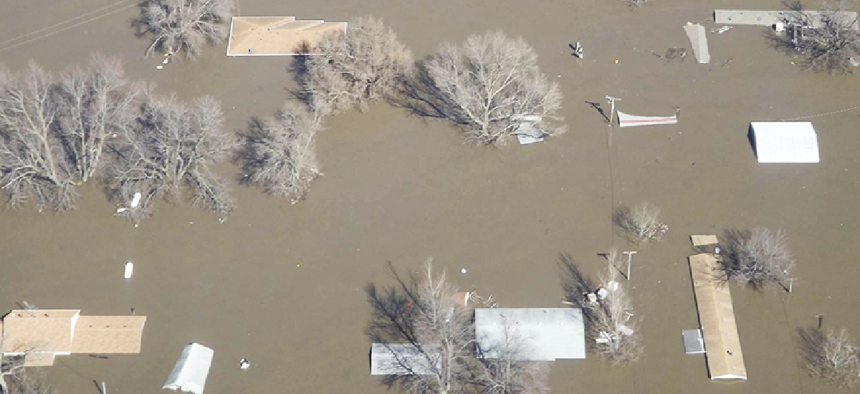Connecting state and local government leaders
New technologies and data sources are helping officials prepare residents in flood-prone areas ahead of rising waters.
As bad as the flooding in the Midwest following the bomb cyclone and snow melt runoff has been, it's about to get worse. According to the National Oceanic and Atmospheric Administration's U.S. Spring Outlook, issued March 21, nearly two-thirds of the Lower 48 states face an elevated risk for flooding through May, with the potential for major or moderate flooding in 25 states.
To help localities prepare, government, researchers and industry are tapping into new technologies to better understand the scope of climate-related events and alert residents in flood-prone areas ahead of rising waters.
For a longer forecast, NOAA – along with the Federal Emergency Management Agency and the Army Corps of Engineers – offers decision-support services through the "Long Range River Flood Risk" web page. The information is refreshed monthly and based on historical precipitation data, current soil moisture and hydrologic models. It shows the locations of over 2,600 stream gauges and indicates the likelihood of flooding.
To improve its computer models, NOAA announced it is launching an Earth Prediction Innovation Center where researchers can develop new and emerging model technology that can be quickly transitioned into forecasts at the National Weather Service.
The U.S. Geological Survey, which manages the sites collecting streamflow measurements, offers a number of online flood monitoring tools, including ones that send text messages about observations from specific gauge stations. It recently redesigned the real-time data pages on the "Water Data for the Nation" website to be mobile-friendly and accessible and easily integrated across data delivery platforms.
Researchers at Rice University have developed a system to monitor the White Oak Bayou, one of the major watersheds in the Houston metropolitan area. The system is based on a flood-warning system Rice built for the Texas Medical Center and relies on real-time, radar-based rainfall estimates from NOAA and generates a predictive flood map -- updated on a website every 15 minutes -- showing where flooding is likely to occur and how deep the waters will get.
Eventually the researchers want to add a predictive element based on local transportation models to the flood maps and alert system so the system can show where flooding that might interfere with patient and ambulance access to hospitals, or police and firefighters ability to get into flooded neighborhoods.
Technology for flood monitoring and prediction is not cheap. The Iowa Flood Center wants to put in 100 more bridge sensors to track water levels of rivers and streams. The new sensors cost $3,600 each to install, and the existing 250 sensors need to be upgraded to 4G technology, according to a report on local news station KCRG.com.
Low-cost sensors have been making inroads. In 2016 the Homeland Security Department’s Science and Technology Directorate First Responders Group partnered with Lower Colorado River Authority in Texas to develop less expensive flood sensors. The sensors cost a fraction of the scientific-grade versions, but it means localities can install many more monitoring devices.
In the Hampton Roads area of Virginia, the StormSense program uses an internet of things-enabled network that integrates data from its low-cost water-level sensors with data from the more traditional sensors deployed by NOAA and USGS to report water levels from storm surge, rain, and tides every six minutes.
Green Stream, an environmental tech company also in tidewater Virginia, has developed a low-cost flood sensor that uses ultrasonic technology to measure the distance from the surface of the water to the device. A public dashboard shows where flooding is occurring, how deep the water is and when it recedes.
Drones are also contributing to more accurate models. Scientists from the Northern Gulf Institute at Mississippi State University used a 14-foot wide drone flying 4,500 feet to take pictures of rising waters in a severe February rainstorm.
The images with a 6-inch resolution were transmitted to MSU's High Performance Computing Collaboratory where NOAA weather forecasters could download them in real time to help refine their predictions. FEMA also accessed the real-time mages for analysis for insights into how better to distribute resources, manage evacuations and support future recovery efforts. Once the drone had landed, the high-resolution images and data were downloaded and will be used to improve flood prediction models, NOAA officials said.
Google, meanwhile, has been experimenting with machine learning for predicting floods along rivers in India where forecasts are limited by funding constraints, insufficient reliable data, manual calibration and the computational difficulty of generating sufficiently accurate large-scale models. Company researchers suggest that machine learning models trained on large amounts of data – from satellites, open data sets and related fields -- can deliver predictions for large areas that are as accurate as those for individual areas based on real-time measurements and short-term forecasts of river water levels.
A different take on leveraging big data for flood prediction comes from ClimaCell, a weather mapping company that is creating virtual weather sensors for the developing world where there is a dearth of timely and accurate meteorological and hydrological information. It combines data from traditional sensors with weather related information extracted from IoT infrastructure to provide more accurate forecasts.
"If weather affects nearly everything, then nearly everything can be a weather sensor," Rei Goffer, ClimaCell's chief strategy officer and a co-founder said.
The system taps into data from airlines and drones transmitting wind, humidity and temperature data; street cameras whose images can be analyzed to infer precipitation and visibility; connected vehicles that report temperature, wiper status, and fog lights; and even variances in signal propagation between mobile phones and cell towers in different atmospheric conditions.
The company's Global Urban Flooding Forecast provides forecasting predictions for flood-sensitive megacities in Asia, Africa, South America and Europe, according to a company blog.
NEXT STORY: Future-proofing compliance




